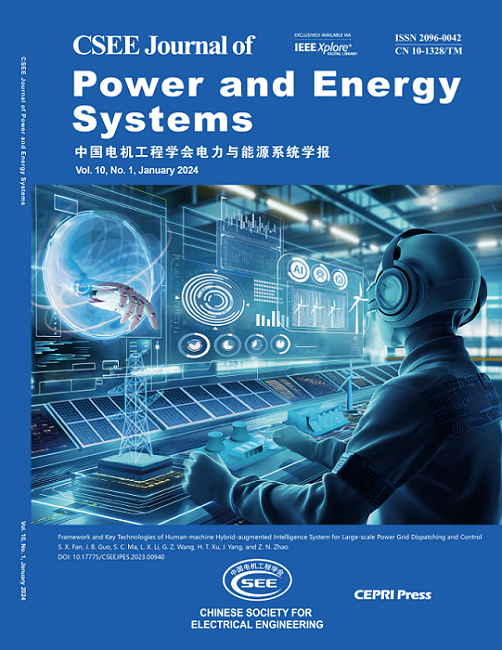基于数据驱动方法的电力系统暂态稳定评估高质量样本生成
IF 5.9
2区 工程技术
Q2 ENERGY & FUELS
引用次数: 0
摘要
深度学习技术被认为是暂态稳定评估(TSA)的有效工具。此外,TSA模型的优越性能取决于慷慨标记的样品。然而,电网是动态的,一些拓扑结构或运行条件会发生很大的变化。传统的方法为每个特定的拓扑生成大量的样本。然而,生成这些标记样本并建立TSA模型是非常耗时的。本文提出了一种基于数据驱动方法的高质量样本生成框架,为TSA模型的训练和更新构建高质量的离线样本数据库。首先,采用基于密度的带噪声应用空间聚类(DBSCAN)方法,将系统算子提供的代表性拓扑聚类为4个不同的类别。这样就收集到了相应的样品。然后,当在线应用中遇到新的拓扑时,使用场景匹配,匹配最相似的拓扑类别。然后,从最匹配拓扑类别的数据库中实现基于实例的迁移学习。最后,构建了深度卷积生成对抗网络(DCGAN)来缓解类不平衡问题。也就是说,不稳定的情况比稳定的情况发生得少得多。从而构建了一个高质量、均衡的TSA模型训练与更新数据库。在华中电网上的综合测试结果表明,该框架能够生成高质量、均衡的TSA样本。此外,大大缩短了样本生成时间。此外,TSA模型的准确性、可靠性和适应性指标都得到了显著提高。本文章由计算机程序翻译,如有差异,请以英文原文为准。
High-Quality Sample Generation for Power System Transient Stability Assessment Based on Data-Driven Methods
Deep learning technology is identified as a valid tool for transient stability assessment (TSA). Moreover, the superior performance of the TSA model depends on generously labeled samples. However, the power grid is dynamic, and some topologies or operation conditions change substantially. The traditional method generates a significant quantity of samples for each specific topology. Nonetheless, generating these labeled samples and establishing TSA models is very time-consuming. This paper proposes a high-quality sample generation framework based on data-driven methods to build a high-quality offline samples database for TSA model training and updating. Firstly, the representative topologies provided by the system operator are clustered into four different categories by density-based spatial clustering of applications with noise (DBSCAN). Thus the corresponding samples are collected. Then, when a new topology is encountered in the online application, scenario matching is used to match the most similar topology category. After that, instance-based transfer learning is implemented from a database of the best-matched topology category. Finally, a deep convolutional generative adversarial network (DCGAN) is constructed to mitigate the class imbalance problem. That is, unstable scenarios occur far more rarely than stable scenarios. Consequently, a high-quality and balanced TSA model training and updating database is constructed. The comprehensive test results on the Central China Power Grid illustrate that the proposed framework can generate high-quality and balanced TSA samples. Furthermore, the sample generation time is dramatically shortened. In addition, the metrics of accuracy, reliability and adaptability of the TSA model are significantly enhanced.
求助全文
通过发布文献求助,成功后即可免费获取论文全文。
去求助
来源期刊

CSEE Journal of Power and Energy Systems
Energy-Energy (all)
CiteScore
11.80
自引率
12.70%
发文量
389
审稿时长
26 weeks
期刊介绍:
The CSEE Journal of Power and Energy Systems (JPES) is an international bimonthly journal published by the Chinese Society for Electrical Engineering (CSEE) in collaboration with CEPRI (China Electric Power Research Institute) and IEEE (The Institute of Electrical and Electronics Engineers) Inc. Indexed by SCI, Scopus, INSPEC, CSAD (Chinese Science Abstracts Database), DOAJ, and ProQuest, it serves as a platform for reporting cutting-edge theories, methods, technologies, and applications shaping the development of power systems in energy transition. The journal offers authors an international platform to enhance the reach and impact of their contributions.
 求助内容:
求助内容: 应助结果提醒方式:
应助结果提醒方式:


